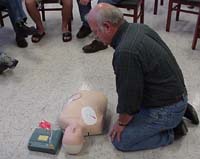WFU begins special defibrillator training program
 Wake Forest University is one of the first organizations in North Carolina to implement a special program by the American Heart Association (AHA) to place life-saving defibrillators on campus and train individuals to use them.
Wake Forest University is one of the first organizations in North Carolina to implement a special program by the American Heart Association (AHA) to place life-saving defibrillators on campus and train individuals to use them.
Wake Forest has started the AHA’s Public Access to Debfribrillation program, or PAD, which aims to increase the survival rate for victims of sudden cardiac arrest.
A key component of the program is training individuals to use an automated external defibrillator (AED), designed so non-medical personnel with only a few hours of training can operate.
Wake Forest’s Student Health employees, University Police officers, members of the Facilities Management safety team, and student EMTs will undergo training, which lasts about 3 1/2 to 4 hours.
Wake Forest will have six AED machines placed on campus. The small, portable machines, which are about the size of a laptop computer, will be in several University Police squad cars, the Student Health Service and with other groups undergoing the training.
The machine provides voice instruction, automatically analyzes heart rhythms and tells the operator to deliver an electric current if necessary.
Greg Messinger, the AHA’s emergency cardiovascular care manager for North Carolina, said providing CPR and defibrillation can be the difference between life and death for a cardiac victim.
“For every minute without defibrillation, the chance of survival decreases by 10 percent,” he said.
Training individuals to use AEDs will strengthen the AHA’s “chain of survival,” Messinger said. The chain of survival is a four-step process to treat victims of sudden cardiac arrest as soon as possible. An immediate call to 911 is the first step followed by reaching the victim quickly to provide CPR and defibrillation until advanced medical care arrives. Advanced care is then provided on the scene or on the way to the hospital.
“If something happens, we want to be prepared,” said Dr. Cecil Price, director of Wake Forest’s Student Health Service and the physician overseeing the on-campus training program. “An AED machine nearby that can be quickly applied is lifesaving.”
Randall Heath, who is helping coordinate Wake Forest’s training program, said “any area where there is a large gathering of people there is an increased risk for a cardiac emergency.”
“The availability of AEDs in those areas can have a significant impact on the outcome of a life-threatening cardiac event,” he added.
Heath is a paramedic and the training education coordinator for the Forsyth County EMS. He is also the coordinator of Wake Forest Baptist Medical Center’s community training center, which is affiliated with the AHA.
Bentley McClure, the general construction foreman with Wake Forest’s Facilities Management office and a member of that department’s safety team, encouraged the university to pursue the program.
McClure, who is also an EMT with special defibrillator certification, is assisting with training. When asked about his hopes for the program, McClure said, “I hope we get a save.”
Categories: Campus Life, Community Impact, University Announcements
Media Contact
Wake Forest News
media@wfu.edu
336.758.5237



